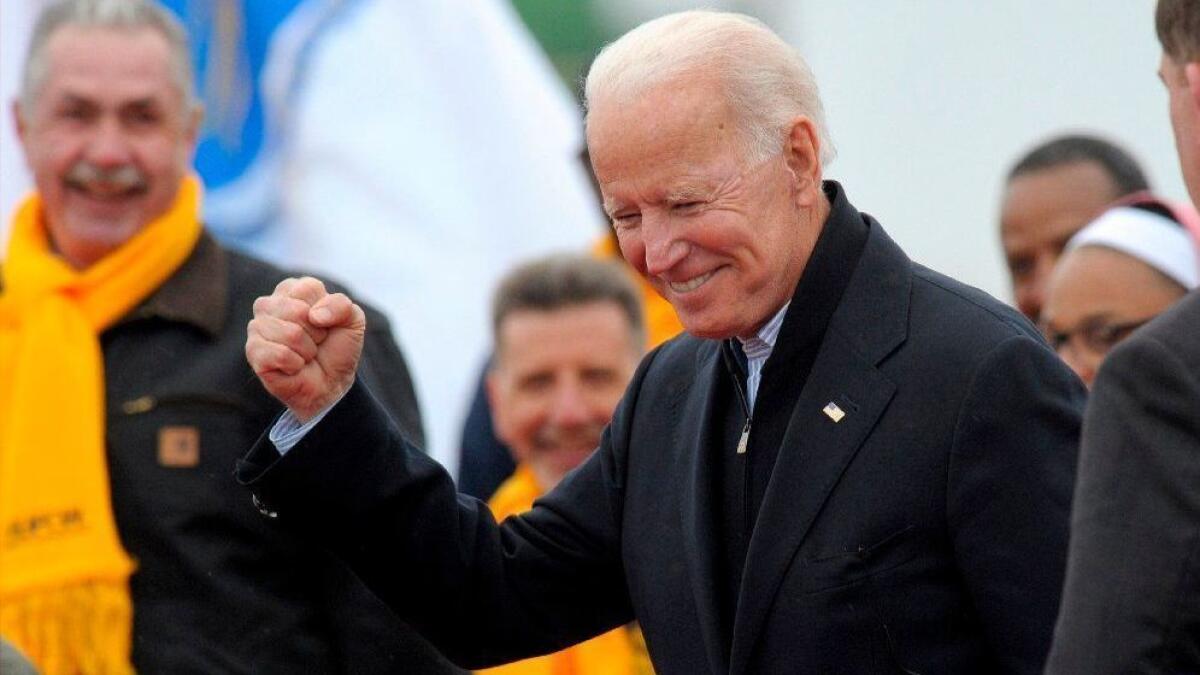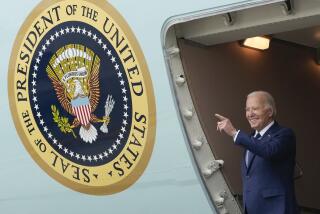Column: The Democrats’ brewing debate on foreign policy

Joe Biden’s entry into the Democratic race for president opens the way for a debate his party and the country both need: a serious argument about foreign policy.
Sooner or later, Bernie Sanders will point out — just as he did in 2016, when he ran against Hillary Clinton — that he’s the only candidate in the race who voted against the Iraq war when Congress voted in 2002.
That will put the onus on Biden, the only candidate who voted in favor of authorizing the war. (None of the 18 others were in Congress at the time.) Biden likely will call his vote “a mistake,” as he did in 2005.
But that shouldn’t end the discussion. The question shouldn’t be how candidates voted 17 years ago, but how they would operate now as commander in chief. How will they choose the next time a decision arises over whether to use military force?
And more: How would they restore the alliances President Trump has trashed? Would they try to pacify the unruly Middle East? Constrain a resurgent China? Reverse a worldwide erosion of democracy and the rise of authoritarianism?
Trump has upended traditional U.S. foreign policy. He’s pulled out of the Paris climate accord and the Iran nuclear accord. He’s waffled on whether he would honor NATO commitments on mutual defense of allies. He’s gotten tough on China, which is good. But he’s gone soft on Russia’s Vladimir Putin, North Korea’s Kim Jong Un and almost every other authoritarian leader he’s met, which is not.
Voters in 2016 couldn’t foresee Trump’s foreign policy because he barely discussed it — except for vowing to force Mexico to pay for a border wall (that never happened), stepping up the war on Islamic State (Trump did that) and negotiating better trade deals (we’re still waiting for most of those).
In 2020, Trump will run as an incumbent, boasting that he is the most successful president of modern times. Democrats ought to make foreign policy part of their rebuttal.
Most voters don’t like Trump’s unconventional style of diplomacy; his job approval on foreign policy stands at about 42%. Public support for the NATO military alliance remains high. Most Americans say they think trade agreements are good for the economy, no matter what Trump says.
Moreover, Democratic candidates aren’t deeply divided on foreign policy: They all want to wind down the “endless wars” in Afghanistan and Iraq; rebuild NATO and other traditional alliances; rejoin international efforts to deal with climate change; and defend democracy and human rights around the world.
“The Democratic Party isn’t tearing itself apart over foreign policy the way it has in previous cycles,” Derek Chollet, a former White House aide in the Obama administration, told me. “There are debates, but they’re not white hot the way they were in 2008.”
Still, the nuances are worth exploring.
Biden comes from the liberal internationalist tradition. He was an early champion of U.S. intervention in the civil war in Bosnia, a step President Clinton took in 1995 to stop the slaughter. But Biden wasn’t reflexively interventionist; in the Obama White House, he argued that U.S. forces in Afghanistan should be drawn down as early as 2009 — advice Obama rejected at the time.
In contrast, Sanders prides himself on his record as a non-interventionist. Except for one vote to authorize the use of military force against Al Qaeda after the attacks of Sept. 11, 2001, he has opposed every U.S. military intervention in this century.
Other candidates fall somewhere in between, but all call for fewer military commitments and more diplomacy.
That doesn’t mean a retreat from American leadership, argues Pete Buttigieg, who’s running in part on his experience as a former Navy officer in Afghanistan.
“We have to participate in a world order,” he said recently. “We can either resent the rest of the world or we can lead it. But we cannot do both.”
There are plenty other detailed questions the candidates should be asked.
Would they continue the current “light footprint” war against terrorist groups, including Special Forces units and drone attacks from Africa to Yemen and Pakistan? Would they seek to reduce defense spending, now at record levels?
Would they seek to rejoin the Trans-Pacific Partnership, the 12-country trade deal Obama negotiated and Trump abandoned? Biden defended the TPP as vice president, but most other Democrats don’t back it.
Would they reduce U.S. aid to Israel in response to its expansion of settlements in the occupied West Bank, as Sanders has suggested? Would they pull all U.S. troops from Syria, as Trump announced — but never did.
We don’t know, mostly because no one has asked. When CNN staged five hours of town hall discussions with five candidates last week, its moderators asked a grand total of three questions about the rest of the world.
The campaign is an opportunity to debate what U.S. foreign policy should be in an era of growing skepticism about the international order. Americans are not isolationists, but they’re no longer willing to pay any price in pursuit of U.S. leadership.
It’s up to the candidates to explain their views — but it’s also up to television moderators and debate panelists to ask the right questions. This time, voters should know what they’re getting before they choose.
More to Read
Get the L.A. Times Politics newsletter
Deeply reported insights into legislation, politics and policy from Sacramento, Washington and beyond. In your inbox three times per week.
You may occasionally receive promotional content from the Los Angeles Times.





